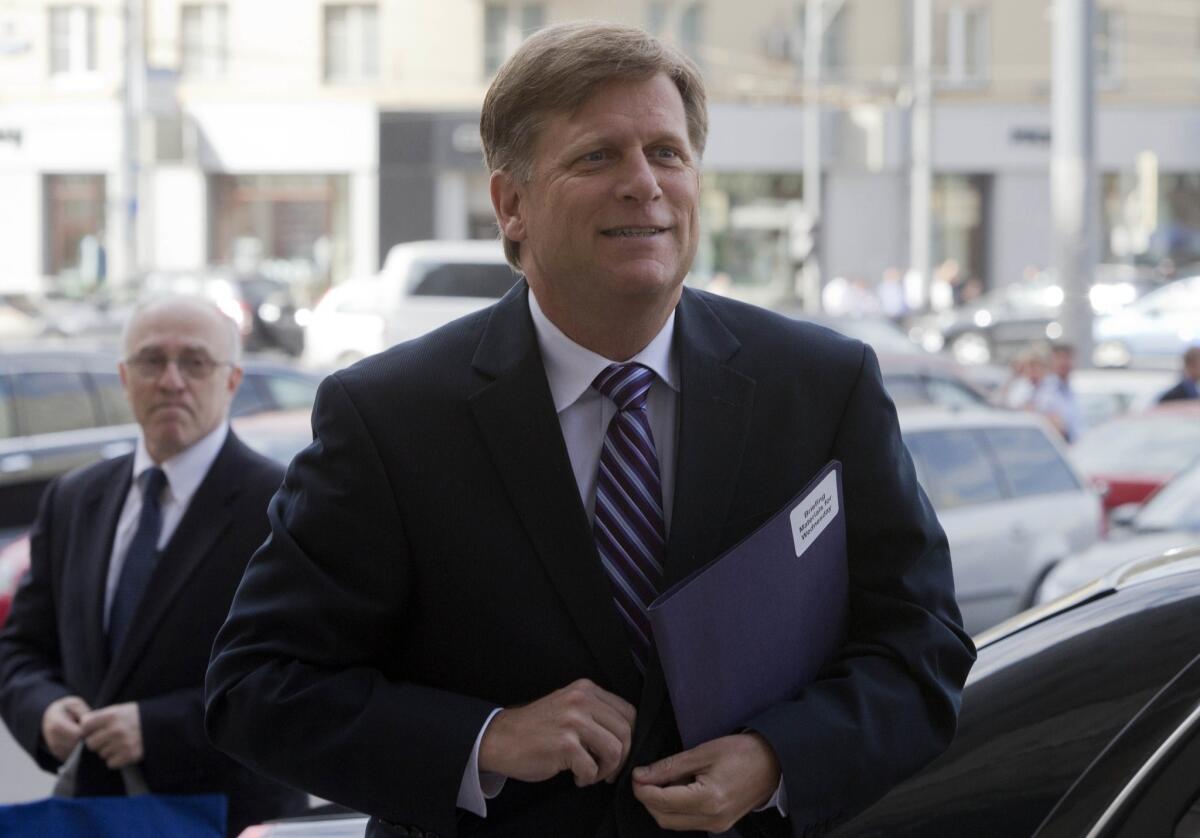Ex-U.S. ambassador: Diplomatic pressure unlikely to sway Russia

- Share via
WASHINGTON — In a generally downbeat assessment of the Ukraine crisis, the just-departed U.S. ambassador to Russia said Friday he believes chances are “slim” for Western diplomatic efforts to convince Russia to end its seizure of Ukraine’s Crimea region.
Former Ambassador Michael McFaul, who had a major role in shaping U.S. policy until his retirement last month, told a group of journalists that while U.S. sanctions could hurt Russian businesses — especially if they include banking penalties — they aren’t likely to dissuade President Vladimir Putin from annexing Crimea.
“At the end of the day, Putin will be willing to make the economic sacrifice if he wants to go ahead with the annexation strategy,” he said.
McFaul said he believed Russia would not halt its joint efforts with the United States to eliminate Syrian chemical weapons or negotiate limits on Iran’s nuclear weapons because Russia believes both of those endeavors are in its interest. But he said there was probably serious concern in the Obama administration that Russia would stop allowing U.S. forces to move equipment out of Afghanistan through Russian territory.
While McFaul held out some hope that Western governments might be able to pressure Russia to withdraw from Crimea, his analysis suggested that the current state of play will continue, with Moscow maintaining control over the strategic southern region.
He said he didn’t believe Putin had plans to invade the important eastern region of Ukraine, but remained “deeply concerned” that it could happen if fighting broke out between pro-Russian and pro-Ukrainian populations there. He said the negative consequences of such a development would be “extremely high.”
McFaul said he believed the current U.S. diplomatic initiatives probably included at least three elements: guaranteed protections for ethnic Russians; amendments to the Ukraine constitution to allow greater provincial autonomy; and a return to a Feb. 21 agreement on the administration of Ukraine that Russia supported. That deal was struck with former President Viktor Yanukovich but abandoned when Yanukovich fled Kiev for Russia.
McFaul said that if the administration does not succeed in budging Russia from Crimea, it would follow a long pattern: Presidents George W. Bush, Ronald Reagan, Lyndon Johnson and Dwight Eisenhower were also unable to force Moscow to retreat from military moves into neighboring states.
McFaul, now back at Stanford University, served for five years as ambassador and was a major architect of the administration’s “reset” strategy, which sought to step up diplomatic engagement with Moscow.
paul.richter@latimes.com
More to Read
Sign up for Essential California
The most important California stories and recommendations in your inbox every morning.
You may occasionally receive promotional content from the Los Angeles Times.











